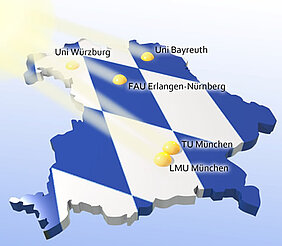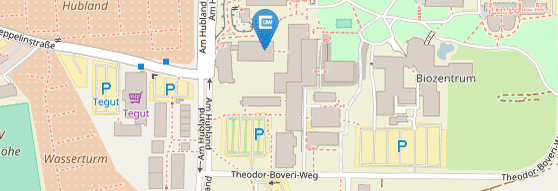Solar Research for Energy Conversion
25.10.2012Five universities in Bavaria are supported by the state-wide Joint Project "Solar Technologies Go Hybrid" to explore new concepts for converting solar energy into electricity and non-fossil fuels. On October 17th, the project was officially launched in Munich.
Early in 2012, the Bavarian Parliament awarded a group of five universities six million euros for the interdisciplinary project "Solar Technologies Go Hybrid". However, significantly more funding will be made available. The plan is to support the extensive research project for five years with a total of 50 million euros. This fundamental contribution will accelerate the development of cutting-edge technologies for solar to chemical energy conversion in Bavaria.
Participating Universities and Research Groups
The funding will be divided within a research network that includes the universities of Bayreuth, Erlangen-Nuremberg and Würzburg, as well as the Technical University and the Ludwig-Maximilians University (LMU) in Munich. In Würzburg, the working groups of Prof. Tobias Brixner, Prof. Christoph Lambert, Prof. Todd Marder and Prof. Frank Würthner (Chemistry) as well as the team of Prof. Vladimir Dyakonov and Prof. Jens Pflaum (Physics) are included.
The diversity of expertise found at each university will enhance the potential for collaborative breakthroughs. Mainly organic materials are explored in the North of Bavaria. Research in Bayreuth involves polymer materials, whereas small molecules which aggregate into larger functional units are the focus in Würzburg. Erlangen deals with nanotubes and other carbon materials, and the two universities in Munich will explore inorganic materials and hybrid organic-inorganic nanosystems.
Start of the Project Celebrated in Munich
To celebrate the inauguration of the ambitious joint project, the Bavarian Minister of Economy, Wolfgang Heubisch, invited all parties to a ceremony held in the “Künstlerhaus” in Munich on October 17th. In his speech, the LMU-President Bernd Huber described the project as a successful example of how well the Bavarian universities cooperate to impact this very important research field. “I think we face major challenges when it comes to the future energy supply. The idea to convert solar energy into electricity and fuel is fascinating," said Huber.
The start of the project was initially coordinated by the LMU. Its president Huber, however, pointed out explicitly that the five participating universities are equally involved in the project. In 2013 the University of Würzburg will take the lead in the group.
Speech by Minister Heubisch
The energy project is designed so that young scientists will especially benefit from it. Minister Wolfgang Heubisch emphasized in his speech: “The research results are strongly continued in teaching and are processed especially by young scientists in the new Key Labs”. With that, we consciously promote young minds who are essential in making long-term contributions to energy conversion strategies. To cope with the challenging requirements of solar energy conversion, it is also crucial to the Minister that the economy adopts innovative scientific solutions and converts them quickly into new technologies.
Network Key Labs at Accepted Centers
Within the five universities are newly designated “Key Labs” that will be well-equipped integrated research centers with international reputations for scientific excellence. The new labs will complement the existing research interests and will enable further collaboration within the network. Thus, as added value to investment, the initiation of future new projects of cutting-edge research projects between the participating sites will be made possible.
Würzburg: Center for Nanosystems Chemistry
The Würzburg Key Lab is located at the Center for Nanosystems Chemistry. This initiative was created in 2010 by Professor Frank Würthner. His research group focuses among other things on the self-assembly of small organic molecules into highly ordered architectures that absorb sunlight and transported the excitation energy to electrodes, where the solar energy may be converted into electricity. Research in this field, known as organic photovoltaics, will be enhanced by two expert physicists also within the network, Prof. Dyakonov and Prof. Jens Pflaum, from the local Center for Applied Energy Research in Würzburg. The photovoltaic team is completed by Professor Wolfgang Brütting of the University of Augsburg, an associate member of the Würzburg Key Lab.
A further goal of the Würzburg Key Lab is the development of artificial chloroplasts, which use light energy to produce fuels similar to photosynthesis in plant cells. In addition to Prof. Frank Würthner, Prof. Christopher Lambert, Prof. Tobias Brixner, and Prof. Todd Marder are also involved in this aspect of the project. In the future, artificial photosynthesis could help mankind to reduce the carbon dioxide content in the atmosphere and to sustainably produce high energy density fuels such as hydrogen, methane or methanol.
Constructions at the Centre of Chemistry
The project "Solar Technologies Go Hybrid" will dedicate about twelve million euros over the entire period to the Würzburg Key Lab. Approximately seven million euros are intended for the construction of a new building in the vicinity of the Center of Chemistry (Hubland) that will begin in 2013. The remaining funding will be used in equal amounts for the purchase of equipment and employment of scientific staff.
Center for Nanosystems Chemistry: zur Homepage Nanosystems Chemistry
Prof. Dr. Frank Würthner, Institut für Organische Chemie der Universität Würzburg T (0931) 31-85340, wuerthner@chemie.uni-wuerzburg.de



